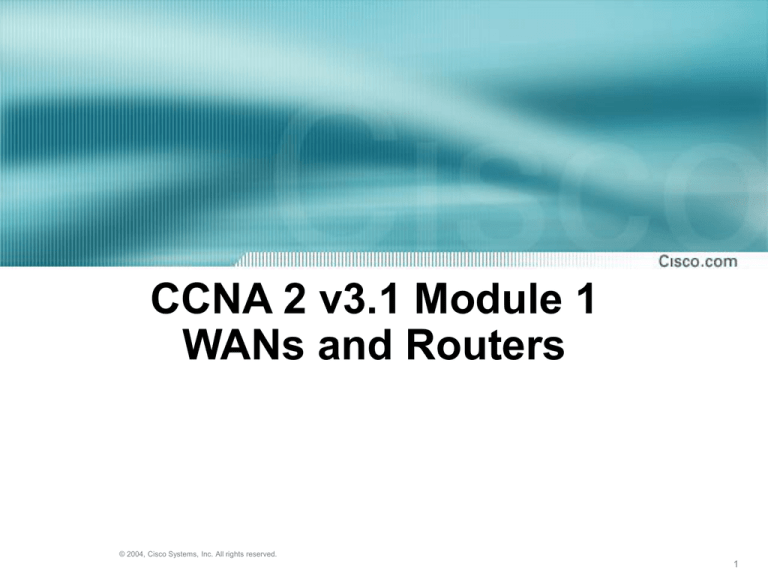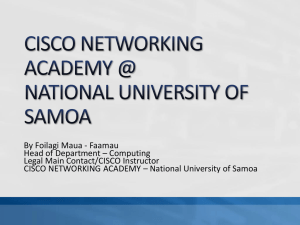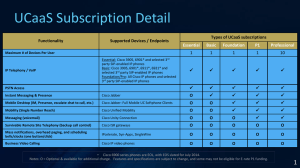
CCNA 2 v3.1 Module 1
WANs and Routers
© 2004, Cisco Systems, Inc. All rights reserved.
1
Purpose of This PowerPoint
• This PowerPoint primarily consists of the Target
Indicators (TIs) of this module in CCNA version
3.1.
• It was created to give instructors a PowerPoint to
take and modify as their own.
• This PowerPoint is:
NOT a study guide for the module final assessment.
NOT a study guide for the CCNA certification exam.
• Please report any mistakes you find in this
PowerPoint by using the Academy Connection
Help link.
© 2004, Cisco Systems, Inc. All rights reserved.
2
To Locate Instructional Resource
Materials on Academy Connection:
• Go to the Community FTP Center to locate
materials created by the instructor community
• Go to the Tools section
• Go to the Alpha Preview section
• Go to the Community link under Resources
• See the resources available on the Class home
page for classes you are offering
• Search http://www.cisco.com
• Contact your parent academy!
© 2004, Cisco Systems, Inc. All rights reserved.
3
Objectives
© 2004, Cisco Systems, Inc. All rights reserved.
4
Introduction to WANs
• A WAN is a data communications network
that spans a large geographic area such
as a state, province, or country.
© 2004, Cisco Systems, Inc. All rights reserved.
5
WAN Devices
© 2004, Cisco Systems, Inc. All rights reserved.
6
WAN Services
© 2004, Cisco Systems, Inc. All rights reserved.
7
Data Link Encapsulations
© 2004, Cisco Systems, Inc. All rights reserved.
8
Internal Configuration Components
© 2004, Cisco Systems, Inc. All rights reserved.
9
Routers Connected by WAN Technologies
© 2004, Cisco Systems, Inc. All rights reserved.
10
Path Determination
© 2004, Cisco Systems, Inc. All rights reserved.
11
Internetwork Routers
• Any internetwork must include the following:
Consistent end-to-end addressing
Addresses that represent network topologies
Best path selection
Dynamic or static routing
Switching
© 2004, Cisco Systems, Inc. All rights reserved.
12
Academy Approach to Labs
• In the academy lab, all the networks will
be connected with serial or Ethernet
cables and the students can see and
physically touch all the equipment.
• Devices that make up the WAN cloud are
simulated by the connection between the
back-to-back DTE-DCE cables.
© 2004, Cisco Systems, Inc. All rights reserved.
13
Router Internal Components
© 2004, Cisco Systems, Inc. All rights reserved.
14
Router Internal Components
© 2004, Cisco Systems, Inc. All rights reserved.
15
Internal Components of a 2600 Router
© 2004, Cisco Systems, Inc. All rights reserved.
16
External Connections on a 2600 Router
© 2004, Cisco Systems, Inc. All rights reserved.
17
Router External Connections
© 2004, Cisco Systems, Inc. All rights reserved.
18
Computer or Terminal Console
Connection
© 2004, Cisco Systems, Inc. All rights reserved.
19
Modem Connection to Console or
Auxiliary Port
© 2004, Cisco Systems, Inc. All rights reserved.
20
Console Port Connections
1.
Configure terminal emulation software on the PC for the
following:
The appropriate com port
9600 baud
8 data bits
No parity
1 stop bit
No flow control
2.
Connect a rollover cable to the router console port (RJ-45
connector).
3.
Connect the other end of the rollover cable to the RJ-45 to DB-9
adapter
4.
Attach the female DB-9 adapter to a PC.
© 2004, Cisco Systems, Inc. All rights reserved.
21
Eight-Pin Connections for Cisco 2600
Series Routers
© 2004, Cisco Systems, Inc. All rights reserved.
22
WAN Types
© 2004, Cisco Systems, Inc. All rights reserved.
23
Router Serial WAN Connectors
© 2004, Cisco Systems, Inc. All rights reserved.
24
DCE Serial Connections
© 2004, Cisco Systems, Inc. All rights reserved.
25
Summary
© 2004, Cisco Systems, Inc. All rights reserved.
26








